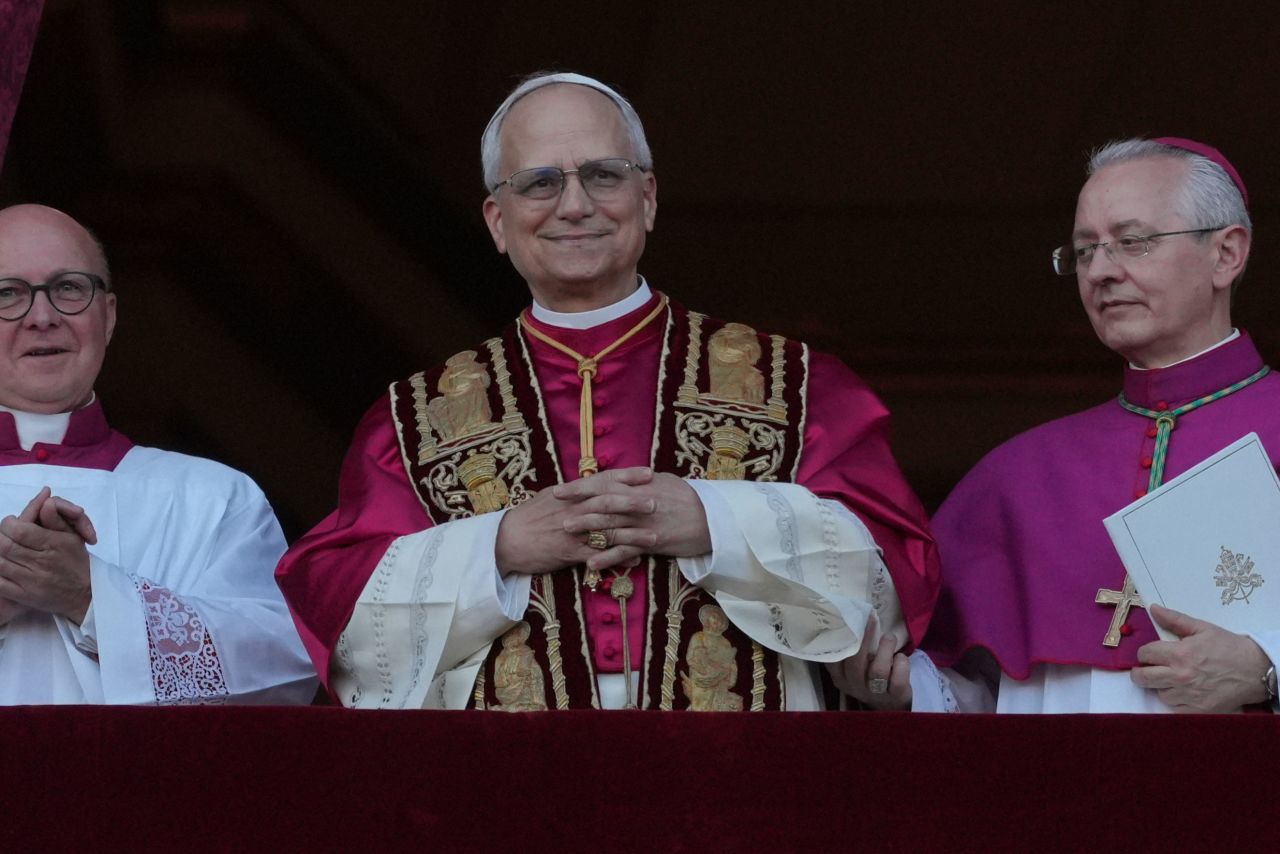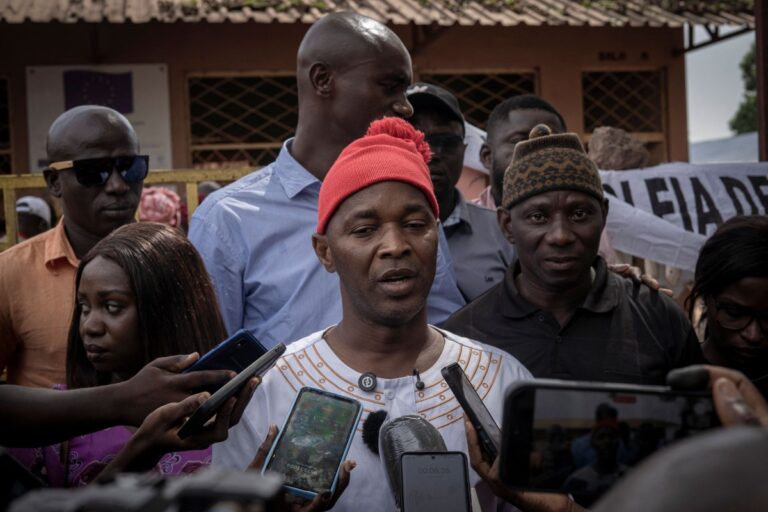Headline
Meet America’s Robert Francis Prevost, First American Chosen As New Pope

In a historic moment for the Catholic Church, Cardinal Robert Francis Prevost has been elected as the new pope, following a 24-hour conclave in the Vatican.
The white smoke that billowed from the chimney of the Sistine Chapel late Thursday signaled the Church had chosen its new spiritual leader—ushering in a new era with the election of the first American pontiff in the Church’s 2,000-year history.
Prevost, a former missionary in Peru and the head of the Vatican’s influential Dicastery for Bishops, will now be known as Pope Leone XIV.
He succeeds Pope Francis, who passed away last month at the age of 88 after over a decade at the helm of the global Catholic community.
Who Is Robert Francis Prevost?
Pope Leone XIV, born Robert Prevost, hails from the United States and brings with him decades of pastoral experience, much of it shaped by his work as a missionary in Peru.
Fluent in Spanish and known for his pastoral sensitivity and administrative rigor, he was tapped by Pope Francis in recent years to lead the Vatican’s powerful office responsible for the appointment of bishops—a key position that shaped the global episcopate.
READ ALSO: BREAKING: Conclave Elects New Pope As White Smoke Rises From Sistine Chapel
His election marks a major milestone not only for American Catholics but also for the global Church, as it signals a possible continuity with Francis’ vision of a more inclusive, compassionate, and globally conscious Catholicism.
Cardinal Robert Francis Prevost has spent a lifetime marked by deep spiritual commitment, international service, and unwavering obedience to the Church’s call—no matter where it led him.
Born in Chicago in 1955, Prevost grew up in a home regularly visited by priests, drawn not just by the warmth of the family, but also by the cooking of his Spanish mother, Mildred Martínez. His early exposure to faith life was reinforced by his father, Louis Marius Prevost, a French-Italian catechist, and by his own involvement as an altar boy and parish school student.
READ ALSO: Trump Reacts To Election Of American Leo XIV As New Pope
Drawn to the priesthood from a young age, Prevost wrestled with whether to become a diocesan priest or join a religious order. He ultimately chose the Augustinian path, drawn to its emphasis on unity, communion, and the legacy of St. Augustine of Hippo. He entered the order’s minor seminary and later studied canon law at Rome’s Pontifical University of St. Thomas Aquinas (the Angelicum). He was ordained a priest in 1982 by Archbishop Jean Jadot, then pro-president of the Vatican’s Secretariat for Non-Christians.
Following his ordination, Prevost was sent to Peru to serve in the Territorial Prelature of Chulucanas, a region with strong ties to the U.S. Augustinians.
His work there — across the jungle, highlands, and coast — deepened his love for the country, and he later became a naturalized Peruvian citizen. In just ten years, he held multiple roles including community prior, director of formation, judicial vicar, and professor.
In 1999, Prevost was elected provincial prior of the Midwest Augustinians. A year into his tenure, he allowed a priest who had sexually abused minors to live in a rectory near a Catholic school in Chicago, a decision made at the archdiocese’s request and later scrutinized publicly.
Two years later, in 2001, he was elected Prior General of the worldwide Augustinian order, serving two six-year terms until 2013. The following year, Pope Francis appointed him apostolic administrator of the Diocese of Chiclayo in northwestern Peru. He was named bishop of the diocese in 2015, overseeing a region that includes one of Peru’s largest cities, as well as rural communities and shantytowns.
In 2022, his leadership in Chiclayo came under fire when individuals accused him of failing to act on abuse allegations against two priests. The diocese strongly denied the allegations when they surfaced in international reports in 2024.
Despite controversy, Prevost continued to rise within the Church’s hierarchy. In 2020, he was appointed to the Dicastery for Bishops, the Vatican body responsible for overseeing the appointment of Latin Rite bishops worldwide. Pope Francis later confided in him about the possibility of becoming its head. Prevost responded humbly:
“Whether you decide to appoint me or to leave me where I am, I will be happy; but if you ask me to take on a new role in the Church, I will accept.”
Headline
12 Die, 30 Missing In Peru Landslide

At least 12 people, including three children, died in a landslide at a river port in central Peru on Monday, and 30 were reported missing, officials said.
The landslide submerged a boat with about 50 passengers on board, and another with none, as they were docked at the port of Iparia in the Amazon jungle region of Ucayali, according to a police report cited by the Andina news agency.
Six people were injured, it added, and a search and rescue operation was underway at the start of the Peruvian rainy season.
READ ALSO:FULL LIST: APC Sweeps Rivers Elections, Wins 20 Of 23 LGAs
Without giving a toll, Peru’s COEN national emergency operations centre said on X that tragedy struck at dawn due to “erosion” of the bank of the Ucayali river.
It said the navy has been called in to help.
AFP
Headline
Nigeria Grants Asylum To Guinea-Bissau Opposition Candidate

The Nigerian embassy in Guinea-Bissau has granted asylum to Fernando Dias da Costa, the country’s opposition presidential candidate, following alleged threats to his life after last week’s military coup, The Cable Reports.
The coup was announced by military officers on Wednesday, just days after Guinea-Bissau’s presidential election in which both incumbent President Umaro Embaló and his main challenger, da Costa, claimed victory before official results were released.
Nigeria condemned the takeover and urged an immediate return to constitutional order.
In a letter to the President of the Economic Community of West African States Commission, Omar Touray, dated November 30, the Foreign Affairs Minister, Yusuf Tuggar, said President Bola Tinubu had approved asylum and protection for da Costa inside the Nigerian embassy in Bissau.
READ ALSO:Guinea-Bissau Military Takeover Is ‘Ceremonial Coup’ – Jonathan
Tuggar wrote that the decision was made “in response to threats made against da Costa’s life.”
“In this regard, it would be appreciated if you would kindly mandate the ECOWAS Stabilisation Support Mission in Guinea-Bissau to provide him protection and security while in the premises of the Nigerian embassy,” the letter stated.
The foreign affairs minister’s Special Assistant on Media and Communications Strategy, Alkasim Abdulkadir, confirmed the letter’s authenticity to The Cable on Monday.
He said, “The decision of the Federal Government of Nigeria to grant asylum and provide protection to Fernando Dia Da Costa falls squarely within Nigeria’s sovereign responsibility and longstanding commitment to regional peace, stability, and democratic governance.”
READ ALSO:Guinea-Bissau Coup: FG Gives Update On Ex-President Jonathan
He added that Nigeria acted “in the broader interest of de-escalation,” saying the government had exercised its discretion “to prevent further deterioration of tensions and to promote social cohesion in Guinea-Bissau and the wider West African sub-region.”
According to Abdulkadir, the intervention aligns with ECOWAS principles and reflects Nigeria’s role as a stabilising force in West Africa.
Following the coup, ECOWAS held an emergency virtual summit of heads of state and subsequently suspended Guinea-Bissau from the regional bloc until constitutional order is restored.
Headline
Trump To Attend FIFA World Cup Finals Draw On Friday

The White House on Monday confirmed US President Donald Trump would attend the draw for the FIFA World Cup finals in Washington later this week.
The United States will co-host the 2026 tournament alongside Canada and Mexico.
“On Friday, President Trump will attend the FIFA World Cup final draw at the Kennedy Centre,” White House Press Secretary Karoline Leavitt told reporters.
READ ALSO:Trump Unveils Fast-track Visas For World Cup Ticket Holders
Trump has made the World Cup a centrepiece event of both his second presidency and the 250th anniversary of US independence next year.
But the giant sporting extravaganza has not escaped the political turmoil caused by Trump’s hardline stance on a host of issues.
Trump, a Republican, has raised the possibility of moving games from some US host cities amid a crackdown on what he says is crime and illegal migration in some Democratic-run areas.
AFP

 Metro5 days ago
Metro5 days agoJUST IN: One Dead As Ngige Escapes Assassination

 News5 days ago
News5 days agoGuinea-Bissau Coup: FG Gives Update On Ex-President Jonathan

 News5 days ago
News5 days agoOkpebholo Fires EDOGIS Managing Director

 Metro5 days ago
Metro5 days agoBandits Demand N500m As Ransom To Release 13 Kaduna Locals

 News5 days ago
News5 days agoBREAKING: NNPCL Reduces Fuel Price After Dangote Refinery, Depot Owners Cut Rates

 News3 days ago
News3 days ago(VIDEO) Obasanjo To Tinubu: Why Are We Negotiating With Bandits?

 Metro5 days ago
Metro5 days agoMan Flees After Lady Dies In Ondo Hotel

 Business5 days ago
Business5 days agoFourteen Nigerian Banks Yet To Meet CBN’s Recapitalisation Ahead Of Deadline

 News5 days ago
News5 days agoPolice, PSC Set Up Committee To Recruit 30,000 New Officers

 News4 days ago
News4 days agoNaira Records First Depreciation Against US Dollar Across Official, Black FX Markets




























